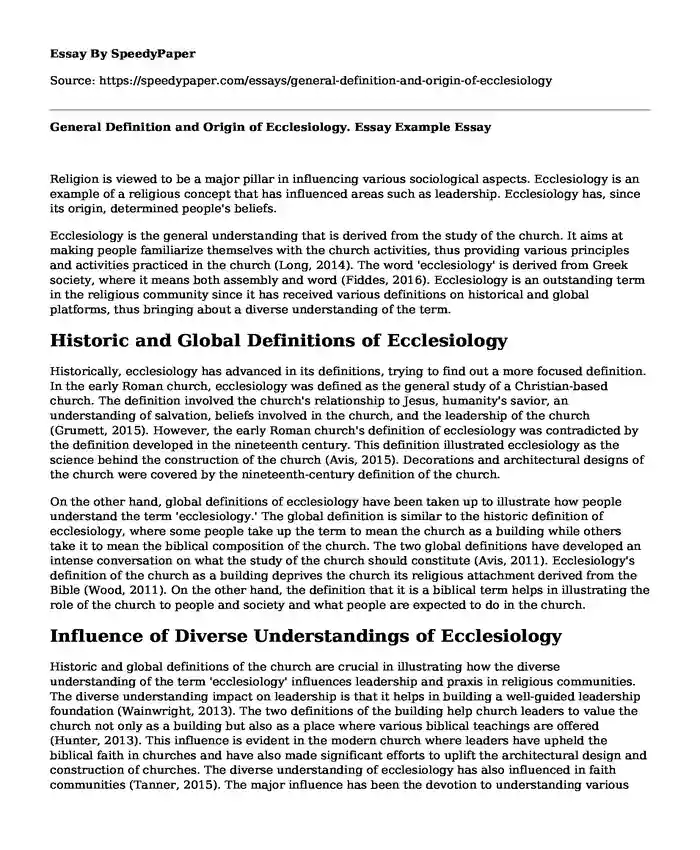
| Essay type: | Definition essays |
| Categories: | Christianity Church Community Bible |
| Pages: | 3 |
| Wordcount: | 653 words |
Religion is viewed to be a major pillar in influencing various sociological aspects. Ecclesiology is an example of a religious concept that has influenced areas such as leadership. Ecclesiology has, since its origin, determined people's beliefs.
Ecclesiology is the general understanding that is derived from the study of the church. It aims at making people familiarize themselves with the church activities, thus providing various principles and activities practiced in the church (Long, 2014). The word 'ecclesiology' is derived from Greek society, where it means both assembly and word (Fiddes, 2016). Ecclesiology is an outstanding term in the religious community since it has received various definitions on historical and global platforms, thus bringing about a diverse understanding of the term.
Historic and Global Definitions of Ecclesiology
Historically, ecclesiology has advanced in its definitions, trying to find out a more focused definition. In the early Roman church, ecclesiology was defined as the general study of a Christian-based church. The definition involved the church's relationship to Jesus, humanity's savior, an understanding of salvation, beliefs involved in the church, and the leadership of the church (Grumett, 2015). However, the early Roman church's definition of ecclesiology was contradicted by the definition developed in the nineteenth century. This definition illustrated ecclesiology as the science behind the construction of the church (Avis, 2015). Decorations and architectural designs of the church were covered by the nineteenth-century definition of the church.
On the other hand, global definitions of ecclesiology have been taken up to illustrate how people understand the term 'ecclesiology.' The global definition is similar to the historic definition of ecclesiology, where some people take up the term to mean the church as a building while others take it to mean the biblical composition of the church. The two global definitions have developed an intense conversation on what the study of the church should constitute (Avis, 2011). Ecclesiology's definition of the church as a building deprives the church its religious attachment derived from the Bible (Wood, 2011). On the other hand, the definition that it is a biblical term helps in illustrating the role of the church to people and society and what people are expected to do in the church.
Influence of Diverse Understandings of Ecclesiology
Historic and global definitions of the church are crucial in illustrating how the diverse understanding of the term 'ecclesiology' influences leadership and praxis in religious communities. The diverse understanding impact on leadership is that it helps in building a well-guided leadership foundation (Wainwright, 2013). The two definitions of the building help church leaders to value the church not only as a building but also as a place where various biblical teachings are offered (Hunter, 2013). This influence is evident in the modern church where leaders have upheld the biblical faith in churches and have also made significant efforts to uplift the architectural design and construction of churches. The diverse understanding of ecclesiology has also influenced in faith communities (Tanner, 2015). The major influence has been the devotion to understanding various concepts in the Bible. For instance, the concept of spirituality in the church has been intensely researched the church where biblical references have been made to prove it (Mulder, 2018). Practices such as communion have also been based on the Bible's teachings, thus illustrating how ecclesiology has been of great influence in faith communities.
References
Avis, P. (2011). Catholic Ecclesiology and the Conciliar Tradition. Ecclesiology, 7(2), 141-145. doi: 10.1163/174553111x559508
Avis, P. (2015). Editorial: From Ecclesiology to Ecclesiastical Polity. Ecclesiology, 11(3), 285-288. doi: 10.1163/17455316-01103002
Fiddes, P. (2016). Versions of Ecclesiology. Ecclesiology, 12(3), 331-353. doi: 10.1163/17455316-01203006
Grumett, D. (2015). Editorial: Ecclesiology from California. Ecclesiology, 11(2), 147-151. doi: 10.1163/17455316-01102002
Hunter, J. (2013). Toward a Methodist Communion Ecclesiology. Ecclesiology, 9(1), 9-18. doi: 10.1163/17455316-00901003
Long, D. (2014). Eucharistic Ecclesiology and Excommunication. Ecclesiology, 10(2), 205-228. doi: 10.1163/17455316-01002005
Mulder, S. (2018). Practical Ecclesiology for a Pilgrim Church. Ecclesiology, 14(2), 164-184. doi: 10.1163/17455316-01402005
Tanner, M. (2015). Ecclesiology for a Travelling Church. Ecclesiology, 11(2), 237-245. doi: 10.1163/17455316-01102007
Wainwright, G. (2013). Methodist Ecclesiology?. Ecclesiology, 9(1), 3-8. doi: 10.1163/17455316-00901002
Wood, S. (2011). Continuity and Development in Roman Catholic Ecclesiology. Ecclesiology, 7(2), 147-172. doi: 10.1163/174553111x559517
Cite this page
General Definition and Origin of Ecclesiology. Essay Example. (2023, Jan 23). Retrieved from https://speedypaper.com/essays/general-definition-and-origin-of-ecclesiology
Request Removal
If you are the original author of this essay and no longer wish to have it published on the SpeedyPaper website, please click below to request its removal:
- Essay Example on Development Federalism
- Free Essay: Development of My Entrepreneurial Capabilities and Future Planned Goals
- Record Review Essay: Rise Above by Black Flag
- Free Essay with Analysis of the Videos about Labour Unions
- Literary Essay Sample on the Themes in "A Rose for Emily"
- Mathematics Models
- Business Strategy Development, Free Essay for You
Popular categories




